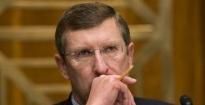Conrad: WH Budget Needs More Work
The top budget chiefs from both political parties criticized President Obama's 2012 budget Monday.
Democrat Kent Conrad and Republican Paul Ryan, the budget chairmen in the Senate and House respectively, share one big beef: The Obama budget remains effectively silent on how to address the long-term drivers of debt -- Social Security, Medicare and Medicaid.
By the end of the decade, those entitlement programs, together with interest owed on the country's debt, could command most of federal tax revenue coming in the door.
Though ideologically different, Conrad and Ryan are both deficit hawks who sat on the president's bipartisan debt commission.
The biggest single measure proposed for deficit reduction in the president's plan is a five-year freeze on non-security discretionary spending, estimated to save $406 billion over 10 years.
"We need a much more robust package of deficit and debt reduction over the medium- and long-term," Conrad said in a statement. "It is not enough to focus primarily on cutting the non-security discretionary part of the budget, which accounts for just 12% of spending this year."
That's why Conrad has been calling for a fiscal summit to be held with the White House and both parties in Congress. He'd like to see an agreement on a plan of attack before Congress votes to increase the country's debt limit, which could happen by May.
Obama in his budget acknowledges long-term fiscal stability can't be achieved simply by cutting discretionary spending. He has also said there is a need for a bipartisan conversation on entitlement reform, but he has yet to back the idea of a formal summit.
Ryan's criticisms of the 2012 budget request were sharper and more wide-ranging. In a conference call with bloggers on Monday, he asserted that the "[the president's budget] is worse than doing nothing." In his view, Obama's budget proposals raise taxes too much and cut spending too little.
Ryan is in the camp that says big spending cuts should be enacted immediately, while Conrad believes the economic recovery should be given a little more breathing room before any major cuts occur.
In that regard, Conrad says the president's budget "gets it about right in the first year. Even as it moves to cut spending, it continues investment in the critical areas of education, energy and infrastructure."
His and Ryan's opinion of the president's proposals matter because they will lead the charge in how Congress crafts its 2012 budget.
Click here to read more.


